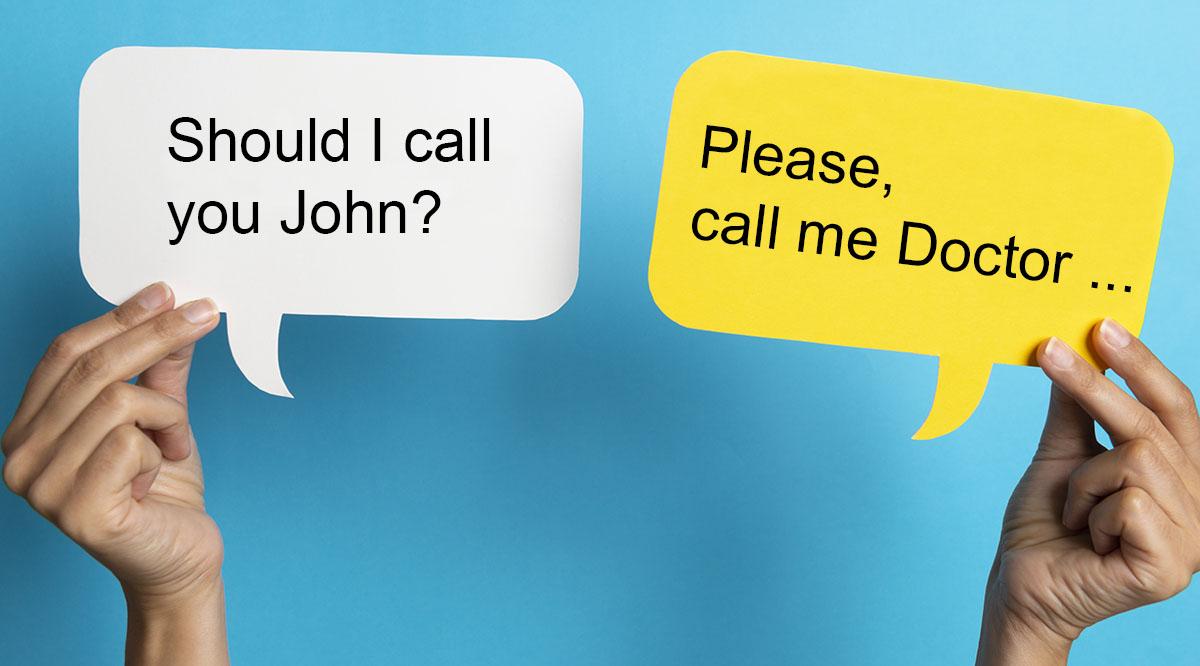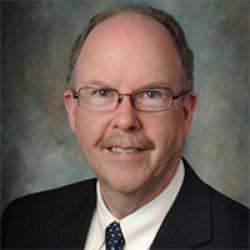Editor’s note: The opinions expressed by the author do not necessarily reflect the views of the AAMC or its members. The author wrote this piece as a counterpoint to one that ran earlier, Please, call me Mara, urging the use of first names.
My parents’ smiling faces remain fixed in my mind even though 42 years have passed since the day I graduated from medical school. The two of them hugged me proudly and called me “Doctor.”
I was raised in a small coal-mining town after the mines dried up, and neither of my parents went to college. When I was young, our family of six lived in a three-room attic of a duplex we shared with several other relatives. My parents sacrificed daily for their children and focused intensely on giving us the education they never had. So my dream of becoming a physician was somewhat dwarfed by their dream of their son being called “Doctor.” The title used that first day did not simply define my status: It was the word used for a dream come true.
Recently, I’ve been thinking quite a bit about the title “Doctor” as several younger colleagues have made the case for asking patients and trainees to call them by their first names. But after some reflection, I am standing solid with the “Doctor” I’ve used for decades.
Words — and names — matter. They set a tone, convey specific types of connections, and establish duties and boundaries. I certainly did not call my father by his first name. He was a tall, stern man named Leo, and I’m amazed that his parents knew he’d grow into the image of a lion. Over the course of many years, my dad and I became friends, and I loved and respected him. But calling him by his first name was unthinkable.
Words — and names — matter. They set a tone, convey specific types of connections, and establish duties and boundaries.
Just as my father was “Dad” to me, I am “Doctor” to my trainees. My title sets the stage on both sides. When learners call me "Doctor,” it helps center me in my role of teacher and mentor: It reminds me that I am a physician with knowledge, skills, and experience worth sharing. It challenges me to stay current, grow, and do all I can to prepare those who will care for the next generation of patients. It challenges me to be my best in each interaction.
What’s more, calling me “John” likely could raise questions in trainees’ minds. In an interaction, am I a friend or an instructor? Is what I say just interesting, as in a conversation, or is it teaching? Am I a peer, or am I a role model?
I gladly accept the responsibility of being a role model. The hidden curriculum — lessons trainees learn by watching how educators act — can have powerful positive effects. When trainees see me as “Doctor,” I feel they understand that my behaviors are ones to emulate. Seeing “John” engage in the same behavior does not convey that it is a professional action and may erode some of its vital impact.
I also see the vital power of being called “Doctor” with my patients. I still remember a woman I’ll call Sally who came to our clinic unable to sleep. She was 23 and the mother of a two-year-old daughter. The first-year resident assigned to the case had that special quality I knew would make her a fine physician. She reported that Sally would not answer any of her questions and instead just stared ahead.
I entered the room wearing my white coat and introduced myself as Dr. McGeehan. I sat next to Sally and gently touched her shoulder. I said she looked tired and asked if she was having trouble sleeping. A door opened a crack — she looked at me and said yes. It was the first time she spoke. I asked why, but got no response. Then some instinct in me led to another question: I asked if the voices were keeping her awake, and she said yes. That conversation allowed us to diagnose and treat her for schizophrenia, and she responded well. What made her open up? I believe it was partly because I was not “John,” but, however briefly, I was her “Doctor.”
I even prefer that friends who see me professionally call me "Doctor." (If one calls me “John,” I don’t correct them since I never want to make someone uncomfortable.) Over the past four decades, these patients almost always call me “John” socially and “Doctor” in clinical encounters. This tells me they want me as their friend at certain times and their physician at others. Knowing these roles allows for the magic that is the doctor-patient relationship. It allows me to assess their health objectively and tell them honestly what they need to know about it. It also allows them to open up. Patients tell their physician things they would never tell a friend, and these details can be critical in diagnosis and treatment.
Some of my colleagues say they prefer "Doctor" because they’ve earned the title. For me, though, the word is not at all about staking a claim on status.
Over the years, I’ve even developed a particular message about titles I share with my medical students. Envision this scenario: A first-year student enters the room and nervously washes their hands as they introduce themselves. The patient has a life in process outside the clinic door, perhaps thinking about time left on a parking meter or someone at home watching their children. Their time is precious, and they now learn that they are seeing a medical student. So I tell my students to introduce themselves not by their first name, but by who they are in the encounter: their full name, their medical school and year, and the attending physician for whom they are working. I find that all this can help instill a certain confidence in the patient. Yet I also urge avoiding the term "student doctor," which could spark an expectation that the student will act at quite a different level. To even subtly suggest that a student is a doctor is unfair to all. These learners should be clear about — and proud of — being medical students.
Some of my colleagues say they prefer "Doctor" because they’ve earned the title. For me, though, the word is not at all about staking a claim on status. My daughter is a brilliant PhD in microbiology and she put in many hard years to earn that degree. She is highly respected, especially by me, but she does not want to be called Doctor. She agrees with me that the term conveys a role — she doesn’t want to be mistaken for a physician — and is not about a rank.
My patients and my students know who I am and what to come to me for. The title makes that clear.
Also, the term is not about creating distance. I love sharing humor with those I teach and talking about life outside of medicine — a “Doctor” is a better doctor if he or she is more than just that. Despite this openness and warmth, I have never had a student or resident call me “John” or ask permission to do so. I hope that this is because they know how much I want to be their mentor and embrace being a role model for them.
Often, a trainee winds up joining the staff where I work, and the relationship becomes one of peers. I then invite the person to call me by my first name. Most finally do so although some find it tough. I keep encouraging the transition, but I suspect they might still need this old guy as a role model.
In time, calling physicians “Doctor” may stop being the norm, but I sincerely hope it does not. I also hope that all physicians will live up to the honor conferred on them by the term. Ours is a profession like few others: We are healers, detectives, scientists, and teachers.
My life has been full because of what my titles have brought me over the years. I have been “Son,” “Grandson,” “Brother,” “Husband,” “Father,” “Coach,” “Teacher,” “Friend,” and “Grandfather.” And I am “Doctor.” My patients and my students know who I am and what to come to me for. The title makes that clear.

